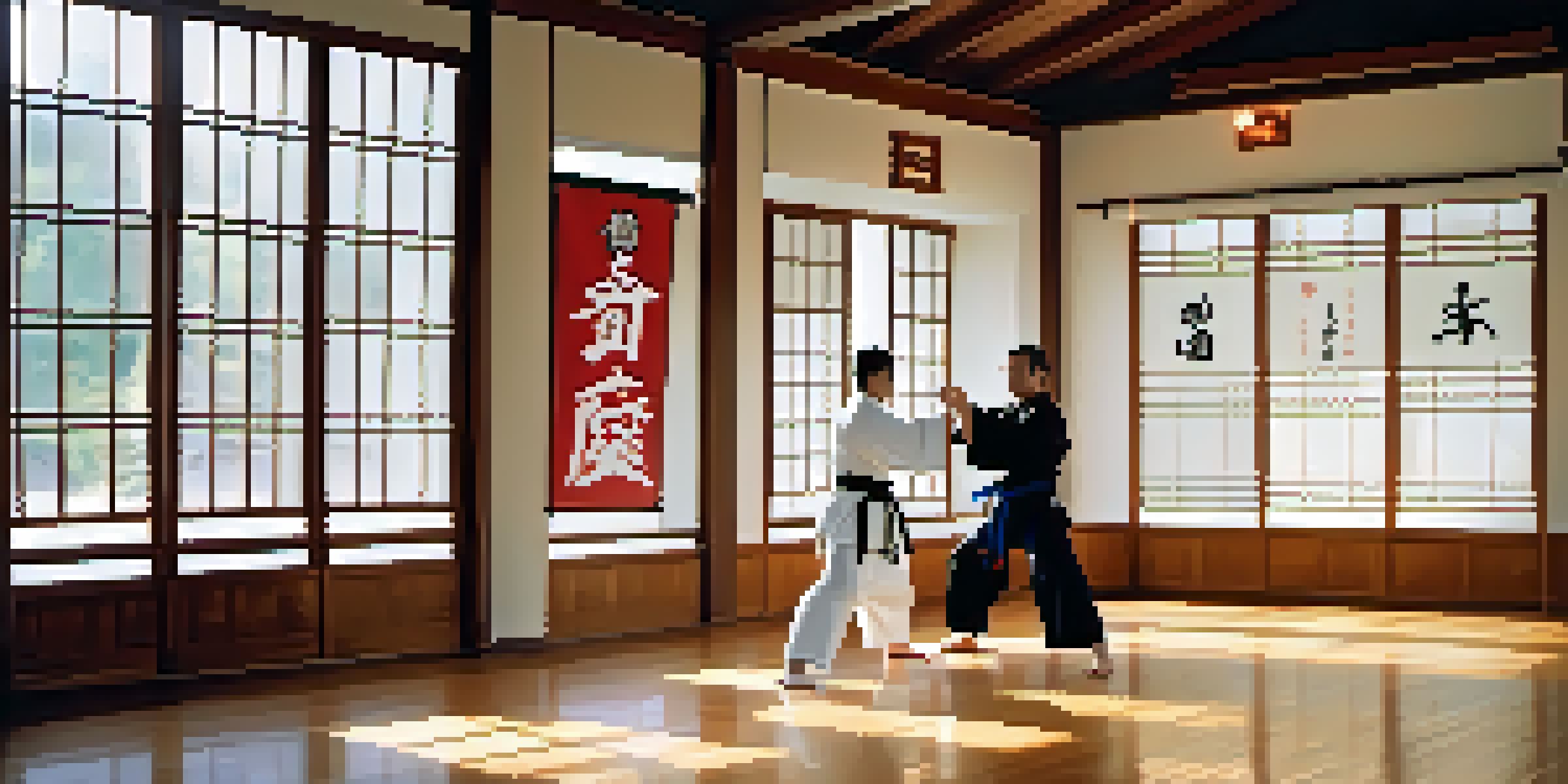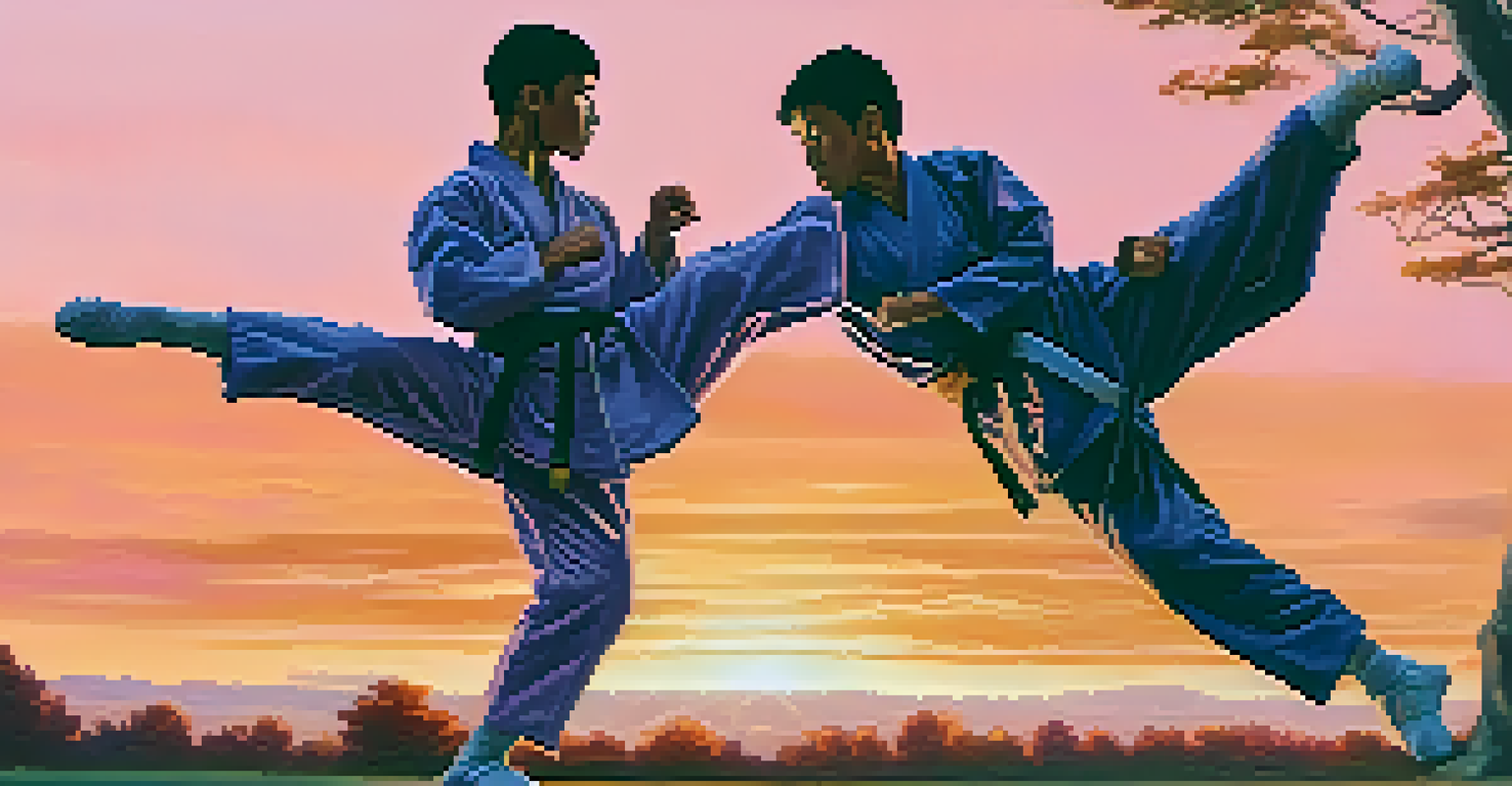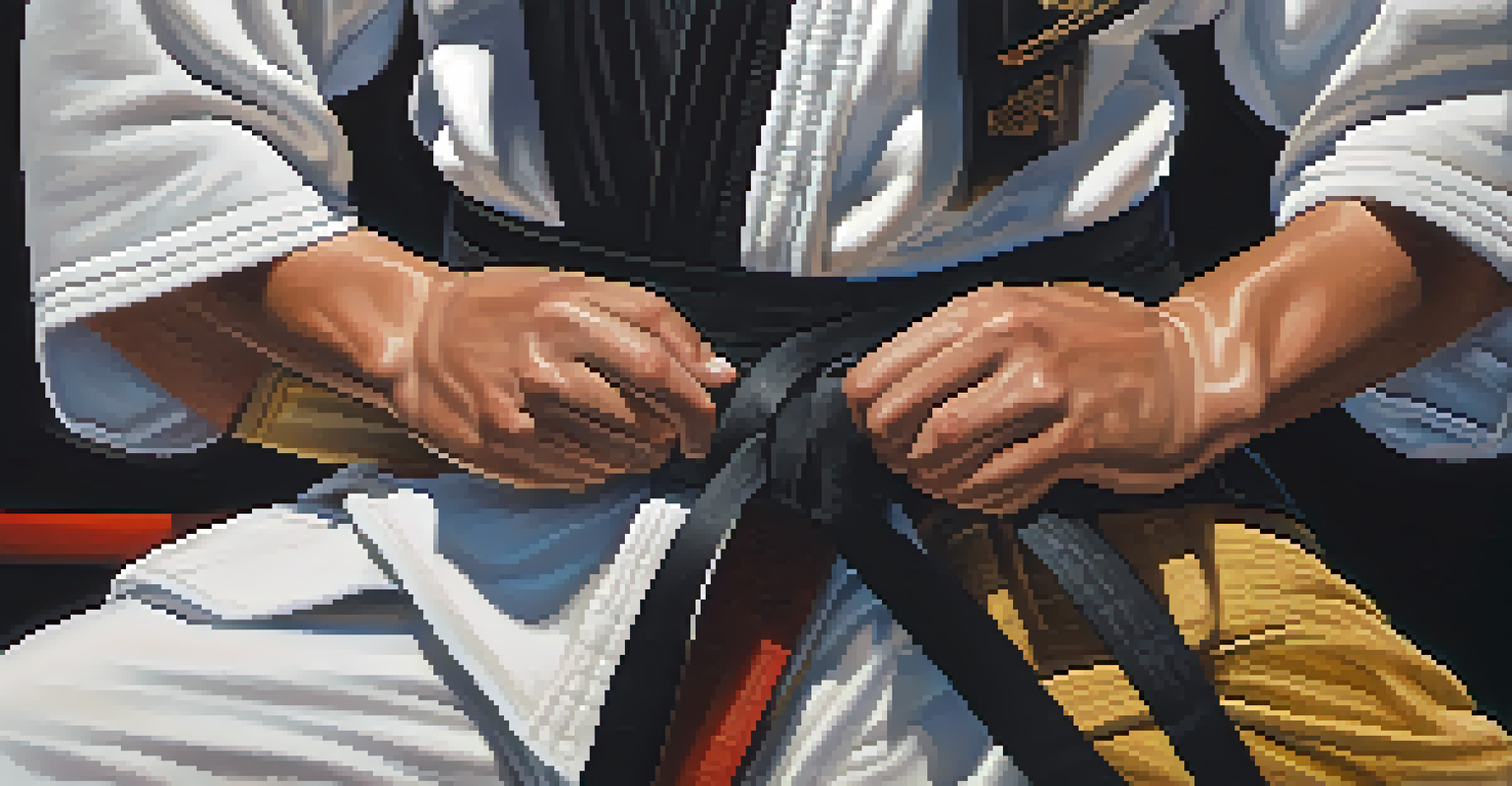The Power of Respect in Martial Arts for Conflict Prevention

Understanding Respect in Martial Arts
Respect is a cornerstone of martial arts training, deeply embedded in its philosophy. It goes beyond mere etiquette; it’s about valuing the skills and dedication of both instructors and peers. In many martial arts disciplines, respect is shown through bowing, addressing instructors properly, and listening attentively. This foundational respect creates a safe environment for learning and growth.
Martial arts are ultimately about the mastery of oneself, and that begins with respect for others.
When practitioners show respect, they foster a culture of support and encouragement. This positive atmosphere allows for open communication, where students feel comfortable expressing their thoughts and concerns. Additionally, respect helps in building trust among students, which is crucial for collaborative training and sparring sessions. Without this trust, the potential for misunderstandings and conflicts increases.
Ultimately, respect in martial arts cultivates a strong sense of community. Practitioners learn to appreciate each other's journeys and challenges, reinforcing the idea that everyone is on their own path. This shared understanding discourages competition in a negative sense and promotes camaraderie, paving the way for conflict prevention.
The Role of Discipline in Conflict Prevention
Discipline is another vital component of martial arts that intertwines with respect. It teaches individuals to control their emotions and reactions, which is essential in preventing conflicts. A disciplined practitioner understands the importance of staying calm, even in heated situations. This self-regulation can significantly reduce the likelihood of physical confrontations.

For instance, during sparring sessions, discipline enables students to respond thoughtfully rather than react impulsively. When one remains composed, they can assess the situation and choose the most appropriate response, whether that’s continuing the practice or de-escalating tensions. This level-headedness is a direct reflection of the respect learned through martial arts training.
Respect Builds a Supportive Culture
Respect in martial arts fosters a positive environment where open communication and trust thrive, benefiting all practitioners.
Moreover, the discipline instilled in martial arts extends beyond the dojo. Practitioners often carry these lessons into their everyday lives, applying them in various situations. This translates to better conflict management skills in personal and professional environments, highlighting the broader impact of martial arts training.
Building Empathy Through Martial Arts Training
Empathy is often overlooked yet is a powerful tool for conflict prevention, and martial arts training emphasizes this quality. When practitioners engage with one another, they begin to understand different perspectives, especially during partner drills and sparring. This exposure fosters a deeper appreciation for the experiences and feelings of others.
The ultimate aim of martial arts is not having to use them.
As students put themselves in their partners' shoes, they develop a sense of compassion that can translate into real-life interactions. For example, a student who learns to respect their opponent’s strength and weaknesses is less likely to approach situations with aggression. Instead, they are more inclined to resolve conflicts through conversation and understanding.
In this way, martial arts act as a catalyst for developing emotional intelligence. Practitioners who harness empathy are better equipped to handle disputes without resorting to violence. This holistic approach to training nurtures individuals who prioritize peaceful conflict resolution, both on and off the mat.
Practicing Conflict Resolution through Role-Playing
Role-playing is a common practice in martial arts that helps students navigate conflict scenarios without physical confrontation. By simulating real-life situations, practitioners can explore various approaches to conflict resolution in a safe environment. This hands-on practice helps individuals articulate their feelings and responses clearly.
For instance, a student might role-play a disagreement with a friend, learning how to express their viewpoint respectfully while also listening actively. These exercises highlight the importance of communication, allowing students to develop strategies that lead to peaceful resolutions. The confidence gained here is invaluable when facing actual conflicts outside the dojo.
Discipline Enhances Conflict Management
The discipline learned through martial arts not only helps practitioners remain calm in conflicts but also equips them with valuable skills for everyday situations.
Ultimately, role-playing reinforces the principles of respect and empathy. By practicing these skills, martial artists are better prepared to handle disputes with grace and understanding in their daily lives. This proactive approach to conflict prevention underscores the transformative power of martial arts training.
Respecting Boundaries in Sparring Matches
Sparring is an essential component of martial arts, but it also comes with the responsibility of respecting boundaries. Understanding and honoring each other's limits is crucial in preventing injuries and conflicts during practice. A respectful sparring partner communicates openly about their comfort levels, creating a safer training environment.
For example, if one practitioner is not comfortable with a particular technique, a respectful partner will adjust their approach accordingly. This mutual consideration not only builds trust but also deepens the bond between practitioners. In turn, it reinforces the idea that respect is fundamental, not just during formal training but in every interaction.
By fostering a culture where boundaries are respected, martial arts practitioners reduce the potential for misunderstandings that can escalate into conflicts. This principle extends beyond the dojo, as learners carry these lessons into daily interactions, promoting a more respectful and understanding society.
The Impact of Respect on Personal Development
Martial arts training significantly contributes to personal development, with respect serving as a key driver. As practitioners learn to respect themselves and others, they cultivate self-esteem and confidence. This newfound self-respect is vital in preventing conflicts, as individuals are less likely to feel threatened or react defensively in challenging situations.
Moreover, respect encourages a growth mindset among martial artists. When students acknowledge their limitations and celebrate their progress alongside their peers, it fosters a supportive environment. This mindset helps individuals embrace challenges rather than shying away from them, which can ultimately lead to more effective conflict resolution.
Empathy Promotes Peaceful Resolutions
Empathy, cultivated through martial arts training, allows practitioners to understand different perspectives, leading to non-violent conflict resolution.
As a result, practitioners walk away from their training not just as martial artists but as well-rounded individuals. The lessons learned about respect and personal development resonate in all areas of life, equipping them with the skills needed to navigate conflicts with grace and poise.
Creating a Culture of Respect Beyond the Dojo
The principles of respect learned in martial arts can extend well beyond the dojo, impacting communities and relationships. When practitioners embody respect, they set an example for others, inspiring a ripple effect. This cultural shift can lead to more harmonious interactions in various settings, whether at home, work, or within the broader community.
For instance, a martial artist who values respect in their training is likely to carry that mindset into their workplace. They may approach conflicts with colleagues in a more constructive manner, emphasizing communication and understanding. This proactive approach not only diffuses tension but also promotes a healthier work environment.

By sharing their experiences and the values of martial arts with others, practitioners contribute to a larger culture of respect. This impact highlights the profound role martial arts can play in shaping individuals and communities, proving that respect is a powerful weapon against conflict.